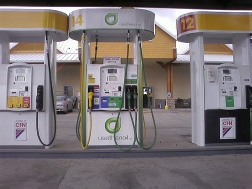


GALLERY


Bio-
BIO-DIESEL
Bio-
METHANOL
Methanol is an alternative fuel for internal combustion and other engines, either in combination with gasoline or directly ("neat"). Methanol may be made from hydrocarbon or renewable resources, in particular natural gas and biomass respectively. It can also be synthesized from CO2 (carbon dioxide) and hydrogen.
BLENDED BIO-DIESEL - B20
Bio-
PETRO ETHANOL - E25
E25 is 25% ethanol and 75% gasoline. In many countries cars are mandated to run on mixtures of ethanol. All Brazilian light-
ETHANOL
Corn and a number of other oil seed crops store energy within their kernels, seeds or fruits. Starches are converted is ethyl alcohol, the same type of alcohol found in alcoholic beverages, used as fuel. It is most often used as a motor fuel, mainly as a biofuel additive for gasoline.
E85 is 15% ethanol and 85% gasoline. It is a high performance fuel, with an octane rating of about 94–96, comparable to Premium gasoline.
Algae grow in sunlight and produce ethanol directly. The energy rich oil is removed without killing the algae. Like fossil fuel, algae fuel releases CO2 when burnt, but unlike fossil fuel, algae fuel and other bio-
Renewable Energy Projects require Expertise, Experience and Project Management and Oversight. We are proud to be part of the unlimited world of biofuels and renewable energy. AP&E INC and EAP&E LTD UGANDA AFRICA experts target work in these areas:




ALGAE BIODIESEL




AP&E INC (‘AP&E”) USA and EAP&E LTD (“EAPE”) UGANDA AFRICA provide innovative energy solutions. We offer customized services to meet your needs: consulting, goal setting, planning, process design, systems development, project management, testing, implementation for a worldwide clientele. We maintains a large pool of top notch professionals from around the world. We are knowledgeable in all the latest areas of traditional energy and alternative green LEARN MORE
A LITTLE ABOUT US








Platinum Media Group LLC
All rights reserved
© 2020 AP&E INC. USA and EAP&E LTD UGANDA AFRICA


GALLERY
